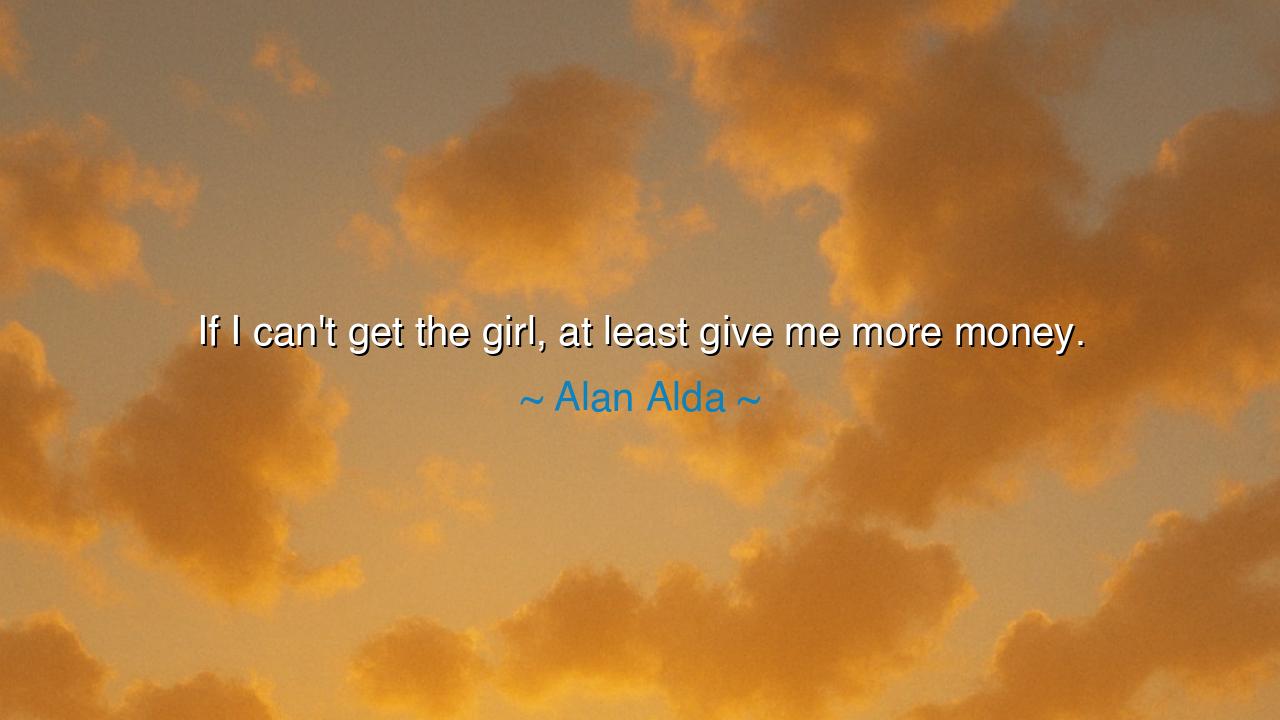
If I can't get the girl, at least give me more money.






Hear the wry words of Alan Alda, spoken half in jest yet carrying the flavor of timeless wisdom: “If I can’t get the girl, at least give me more money.” At first glance, they seem but a playful remark, a comedian’s twist on disappointment. Yet behind the humor lies the eternal tension between desire and consolation, between the sweetness of love and the cold comfort of wealth. For Alda’s jest is an echo of the human heart, which, when denied one treasure, seeks to soothe itself with another.
The girl in his saying is not merely a romantic figure, but the symbol of affection, companionship, and the deeper riches of the soul. To “get the girl” is to win the reward of love, that prize which poets have exalted above all gold. Yet love is fickle, not always granted even to the deserving. And so Alda turns with irony to the other great pursuit of humankind—money, that pale substitute for intimacy, that currency of consolation when the heart is left empty. His words remind us of the choices men make when their true longing is denied.
The ancients knew this struggle well. In the myths of Greece, Paris was offered three gifts from the goddesses: power, wisdom, or the love of the most beautiful woman in the world. He chose the woman, and by this choice began the war of Troy. Love, they taught, is valued higher than wealth or strength, yet it is also the most perilous prize. Alda’s quip carries the same truth in reverse: if the highest reward cannot be won, at least let the lesser, more practical one be granted. Thus the jest is also a mirror of the old stories.
Consider too the life of King Midas. He sought gold above all else, yet when his touch turned his daughter into lifeless treasure, he saw the futility of wealth without love. Midas had all the money, yet none of the girl—and in that absence, all his riches became dust. Alda’s words, though lighthearted, point to the same warning: wealth may fill the purse, but it cannot heal the longing of the heart.
Yet we should not mistake Alda’s humor for cynicism. In his wit lies a recognition of human resilience. When love fails, men and women do not simply collapse; they adapt, they seek another path, they find consolation where they can. Money may not be equal to love, but it provides stability, opportunity, and a measure of comfort in a world that often denies the deepest desires. His jest teaches us that even when the greatest prize eludes us, we may still endure, making use of what is given.
The lesson, O seeker, is this: never confuse substitutes for the true prize. Pursue love, connection, and meaning as the highest goals of life, for they are treasures greater than gold. Yet when they are denied, do not fall into despair. Accept the lesser gifts—wealth, work, or stability—as stepping stones until love may one day return. For though money can never replace the girl, it can sustain you in the meantime, giving you the strength to continue your journey.
Therefore, remember Alda’s wisdom clothed in jest: when the heart’s desire slips from your grasp, seek not bitterness but resilience. Laugh, as he did, at the absurdity of human striving. Use what consolation comes to you, but never forget the greater treasure that truly fulfills the soul. For in the end, the girl and the money are not equal prizes, but the heart that endures disappointment with humor and courage is richer than both.
So live with this truth: if you cannot win what you most desire, endure with grace, use what is given, and keep your spirit unbroken. For fortune may deny you once, but the heart that laughs and persists is never truly defeated.






AAdministratorAdministrator
Welcome, honored guests. Please leave a comment, we will respond soon